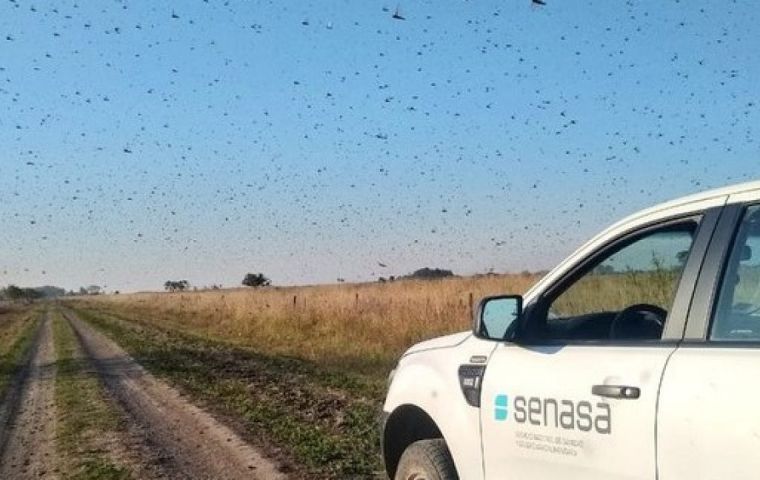MercoPress. South Atlantic News Agency
Huge 15 sq km locust swarm threatens Mercosur agriculture
 “We are following the movement of the plague,” Héctor Medina, a coordinator at SENASA, said on Thursday
“We are following the movement of the plague,” Héctor Medina, a coordinator at SENASA, said on Thursday  Agriculture minister Tereza Cristina Dias, declared on Thursday a “phytosanitary emergency” in Río Grande do Sul and Santa Catarina due to the swarm.
Agriculture minister Tereza Cristina Dias, declared on Thursday a “phytosanitary emergency” in Río Grande do Sul and Santa Catarina due to the swarm. Argentina and Brazil are monitoring the movement of a 15-square-kilometer locust swarm in Argentina’s northeast, though authorities and specialists said so far it had not caused significant damage to crops in the South American countries.
Argentine food safety body SENASA said the swarm, which initially entered Argentina from Paraguay in late May, contained about 40 million insects. It is in the province of Corrientes, near borders with Brazil, Uruguay and Paraguay.
Argentina and Brazil are among the world’s largest soy and corn exporters.
“We are following the movement of the plague,” Héctor Medina, a coordinator at SENASA, said on Thursday. Due to the arrival of a cold weather front from the south, the movement of the locusts would be limited in the coming days, he added.
The low temperatures “will prevent them from moving and reproducing. The lethargy makes them stay still,” Medina said. Winds could eventually push the cloud of locusts into a neighboring country, he added.
Brazil’s agriculture ministry is also monitoring the swarm and has asked farmers in the south of the country to be on alert, although it has concluded that the locust cloud is unlikely to move into Brazilian territory for now.
Nevertheless, Farming Minister Tereza Cristina Dias, declared on Thursday a “phytosanitary emergency” in the states of Río Grande do Sul and Santa Catarina due to the swarm.
In Argentina, both SENASA and the Buenos Aires grain exchange said they were less worried by the locust swarm than issues of dry weather impacting crops.
“For now (the swarm) is not a problem, we are more concerned about the humidity issue for wheat planting than locusts,” said Esteban Copati, head of agricultural estimates at the exchange, who added the swarm was moving over a marginal farming areas.
The pests have raised concerns in Brazil. A representative from the Aprosoja growers association in Rio Grande do Sul said they feared the locusts would enter the state where corn is still being harvested and wheat being grown.




Top Comments
Disclaimer & comment rulesCommenting for this story is now closed.
If you have a Facebook account, become a fan and comment on our Facebook Page!